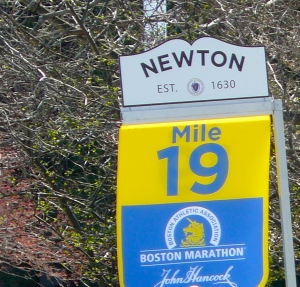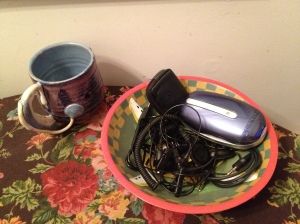How do I look back over this year and summarize? Is this an end? Have I arrived at my destination? When I set out on this journey I think my destination was not well understood. I had a plan based on too little information and some unrealistic expectations. As I’ve experienced the highs and lows of coming to terms with this life-changing experience my notion of destination has changed. I think my journey, in some ways, is just beginning. I’m learning what it means to be deaf with a cochlear implant. Now some people will take offense to that statement. I am not Deaf with a capital “D” which implies identification with the Deaf culture. However, from a clinical perspective my unaided hearing does not provide adequate speech discrimination, i.e. I’m deaf. I’ve come to understand that the implant is a hearing tool and not a cure for deafness. It enables me to be successful in the hearing world with the caveat that I still live with hearing loss and need to educate others about what I require for successful communication.
Going into the CI experience what were my hopes? I thought that certain, or some, challenging listening situations would become easy. That certain people, whose voices I found hard to hear, would now be clear to me. The mystery of rapid group chit-chat would magically unravel…
The reality was not so clear cut. I achieved degrees of improvement that did not entirely resolve these challenging listening situations. There are people that are still hard to hear. While my audiologist tells me I’m an “A” student in CI achievement, the real world is quite different from the audiologist’s sound booth. The shangri-la of hearing without effort remains beyond my grasp.
Do I hear more than I used to? Yes. Do I hear sounds I may have never heard before? Yes. Can I use assistive technology to help me hear better in certain situations? Yes. Can I hear everyone well in all situations? No. Does this bother me? Hell, yes!
I kept feeling like I “should” be able to hear even better now than I do. I’m greedy. I want more. I was told by a wise counselor that I need to forgive myself for not hearing perfectly. No amount of effort will give me normal hearing. This simple message is surprisingly tough for me. I bought into our cultural belief that with the right amount of motivation and effort we can do anything, which is not universally true. When I was told this I cried because my entire life I did do very well in spite of hearing loss. However, there are limits for me, and those limits have nothing to do with me or my value as a person. I’m working on really believing this. It’s the first time in 45 years that anyone said this to me…
I actively work to better understand, and accept, my hearing ability today and its limitations. I work on asking for the right kind of help and not apologizing for needing help. I tell my story as often as I can and find that revealing my vulnerabilities brings support and connections with other people that I could not have foreseen. I am not alone.
When reading other online blogs and CI vendor forums there are lots of miracle stories. I’ve got to comment about those “miracle” stories. My reaction is yes, but. Even in our special club of CI users there are those who, ahem, embellish. Now, perhaps I’m being harsh and this really is their perception but it’s just that, perception. The reality may be different. For example, my audiologist told me the high speech scores that are reported are sentence scores and not single word. This is a huge difference because sentences can be guessed way more accurately. Also, many people who write had sudden loss, versus slow gradual loss like myself. This too makes for a much different CI experience. I’m also meeting and hearing from older folks who may be retired versus working in a challenging day to day hearing environment. I’m also meeting CI users whose jobs were previously revised to require less phone and meeting communication requirements, providing a much more controlled hearing life. So, their expectations post-implant were different as well. Another group are long-time hearing aid users, who were accustomed to the challenges and limitations of device-assisted hearing. And, finally, those who experience some disappointment with the CI often don’t want to write about it. I think many still take it as personal failure and human nature is to shy away and not talk about it.
For the past six months I’ve been doing a self-directed crash course in hearing assistive technology. Due to my technology background I’m comfortable experimenting on myself. Now that I have more range in my hearing I can benefit from technology that was not previously available to me. For example, amplification can now provide information rather than just distortion because I now hear high frequencies. This is not admitting defeat. It’s being pragmatic. And it’s interesting to see how others perceive my experiments. In some ways I feel like it separates those who “get it” and want to help, or think it’s cool, versus those who don’t. I’ll admit sometimes I’m surprised. It can be a tough pill to swallow when you experience a lack compassion in response to your explanation of what you need to communicate successfully. However, I try to be somewhat philosophical and say that each experience, even it is difficult, is teaching me something. I’d prefer all the lessons were pleasant and easy, but…
Is this too negative? I’m trying to be honest with myself and others. I am so grateful for the lessons of this past year. I’m finally learning that I have a lot to offer others in telling my story and sharing what I learn about living with hearing loss and with a cochlear implant. My journey continues.
Someone asked me what my favorite new sound is now that I hear so much more. The answer came to me almost immediately… I love the sound of the rain.




 So my CI friends say air travel is no biggie. Security scanners, etc. should all be fine. I’m supposed to walk on through with the “normal” folk. My surgeon advised me to heed any warnings for people with pacemakers since that’s another surgical implant with metal in it. Uh, okay. It’s been a while since I’ve flown anywhere so I am a little nervous.
So my CI friends say air travel is no biggie. Security scanners, etc. should all be fine. I’m supposed to walk on through with the “normal” folk. My surgeon advised me to heed any warnings for people with pacemakers since that’s another surgical implant with metal in it. Uh, okay. It’s been a while since I’ve flown anywhere so I am a little nervous.